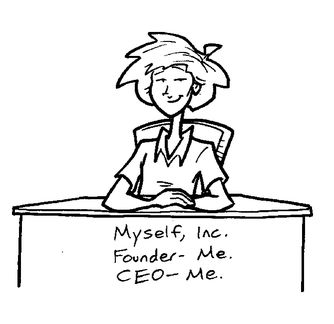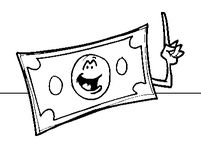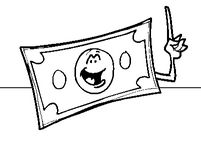
Chapter 17
Thinking About a Business of Your Own
In This Chapter
✧ Meeting teens who have already started businesses
✧ Looking at what teen entrepreneurs are doing
✧ Understanding what it takes to be an entrepreneur
✧ Considering the good, the bad, and the ugly
✧ Planning now for your own business
One of the definitions of an entrepreneur in Webster’s New 20th Century Unabridged Dictionary is “a person who organizes and directs a business undertaking, assuming the risk for the sake of the profit.” Although that definition is adequate, I don’t think it’s complete. An entrepreneur is far more than that. An entrepreneur is an adventurer—a risk taker. An entrepreneur is someone who looks past the status quo, who wonders why things can’t be done better. An entrepreneur is brave, enthusiastic, motivated, determined, and persistent. A real entrepreneur is a person who sets a goal, wants it badly, and refuses to give up on his or her way to attain it.
We admire entrepreneurs in this country. We look up to people who start and grow their own businesses, who are their own bosses, and who make their own rules. Many teenagers are jumping into the entrepreneurial arena and they’re starting to be noticed and looked up to, as well. In this chapter, we’ll look at who some of these teenage entrepreneurs are and what they’re doing. We’ll discuss some of the benefits and risks of starting your own business—the advantages and disadvantages. You’ll also have a chance to evaluate yourself to see if you might have what it takes to be an entrepreneur.
Teenage Entrepreneurs
There have always been teenage entrepreneurs. The kids you see pushing lawn mowers up and down the streets in the summertime, looking for a yard that needs to be mowed; the ones that grow flowers in a backyard garden and go door to door selling bouquets of them; the teens that shovel snow, start baby-sitting and dog-walking businesses, or organize cleaning services—all of them are entrepreneurs.

Money Matters
We often think of entrepreneurs as people like Donald Trump or Bill Gates, but there also are hundreds of entrepreneurs in your own community of all ages, races, and income levels.
Entrepreneurial spirit abounds, even in little kids. Pay attention in the summertime to kids who set up lemonade stands or sell apples they pick from the trees in their backyards. Even little kids can weed a garden for a neighbor or gather newspapers for somebody who’s away.
The truth is that the desire to be an entrepreneur comes naturally to a lot of people. The hard part is turning that desire into an enterprise that works. It’s not as easy as feeling that you’d like to do something; however, that’s not to say that it can’t be done.
Who Are They?
Who are these teenage entrepreneurs who are making the news—not to mention the money? Let’s have a look at some examples:
Mike Nowotarski, an 18-year-old from St. Petersburg, Florida, turned his entrepreneurial inclinations into a successful video production business. He began working with video production as a high school sophomore and loved it. He stayed heavily involved in his school’s TV crew, and by the time he was nearing graduation, he felt he was good enough to get paid for production work.
Nowotarski’s dad lent him money for the basic equipment he’d need and set him up with their family’s lawyer to oversee the legal work necessary for starting a company. He opened his company, Premier Productions, in November 1999. Ten months later he’d earned $10,000. He’s currently in college, studying video while continuing to run his company.

Money Matters
To get an overview of what 100 young entrepreneurs have done, go to www.youngbiz.com and check out the YoungBiz 100.
Nowotarski’s friends, Craig Brandys and Justin Griego, also have started their own company, through which they design Web sites. They expected to make $30,000 during their first full year in business.
In an article published in the St. Petersburg Times, Brandys said the idea to start his own business came to him one morning as he was lying in bed, trying to find the energy to crawl out and go back to his job at a local steak house. Brandys was a host there, working eight-hour shifts that sometimes turned into double shifts, and earning $6 an hour. “I was sick of it,” Brandys was quoted as saying. “One morning I was in bed and really couldn’t motivate myself to get up and go to work. I called Justin up and said, ‘Hey, let’s found a company to design Web sites and make a lot of money.’” And that’s what they did.
Leigh Taylor, a 17-year-old from Dewey, Oklahoma, earns $400 per month training horses for other people. She started her business when someone who had observed her with her own horses asked her to train a horse for his daughter. Taylor says she spends between 10 and 12 hours a week on her business.

Imagine That
Young entrepreneurs are calling themselves “treps,” an abbreviated take on a word that’s hard to say, and even harder to spell. Young entrepreneurs who operate on the net are eTreps.
Alejandra Torres is only 13, but she’s earning $120 as a child-care provider and investing most of the money she earns in mutual funds. She lives on a military base in Oahu, Hawaii, where there are a lot of kids, and she often watches as many as five at a time. She charges $2 an hour per child.
Anand Shimpi, the 18-year-old from Raleigh, North Carolina who was YoungBiz magazine’s top entrepreneur of 1999, reports almost $1 million in yearly revenues.
Brad Ogden, 18, of Detroit, who ranks in the first five of YoungBiz’s top 100 entrepreneurs, owns and operates Virtual Webpages, a Web design company that earned more than half a million dollars in 1999.
These are just a few examples of teenagers who have launched successful businesses. No doubt, there are thousands of you out there. Not all of these young entrepreneurs are making a million, or half a million, or even more than a couple of thousand dollars a year; but they are making money. Statistics that YoungBiz magazine gathered show that at least 60 percent of teenage entrepreneurs earn more than they would if they worked at The Gap or the local steak house. The average income of those on YoungBiz’s top 100 list for 1999 was $28,000.
What Are They Doing?
Although the young entrepreneurs who are making the most money tend to be in computer-related endeavors, there are teens out there with companies whose products range from earthworms to handmade art-deco benches. The following are some of the great businesses listed in YoungBiz magazine’s 1999 list of the top 100 entrepreneurs:
✧ Tim Thorpe, 16, of LaFayette, New York made about $8,000 in two months selling pumpkins to use for jack-o-lanterns and pies.
✧ Chase Harps, 15, of Atlanta, Georgia, earns between $150 and $200 per week selling cologne that he produces.
✧ Christina Smith, 15, of Brooklyn, New York, earns about $75 per week selling personalized accessories, such as leashes and collars, for small dogs. She decorates them with ethnic, Aztec, and flower patterns.
✧ Maggie and Allie Cawood-Smith, both age 12, of Auburn, California make between $50 and $100 per week selling the lip balm they make out of natural ingredients. The twins sell to stores and individuals.
✧ Brad Sweet, 18, of Relay, Maryland sells an average of 20 custom birdhouses per year for $75 to $300 each.
✧ Jeff Wahl, 16, of Binghamton, New York earns about $235 per week teaching dance lessons to adults and youth. He also choreographs shows for local music programs.
As you can see, there’s great diversity in what these young entrepreneurs are doing.
Knowing If You Have What It Takes
People start businesses for all kinds of reasons. Some do so because they want to make millions of dollars and retire when they’re 50. Others want to create products and services that will help others and improve society. Some want to provide a good life for their families; others just can’t stand the thought of having a boss and having to show up at a job every day for the next 40 years.
Psychologists who have studied entrepreneurs say that the primary reason that people start and successfully run their own businesses is because they feel the need to achieve something. A recent article in the Harvard Business Review says that drive for achievement, or the desire to do something better or more efficiently than it’s been done before, is the strongest motivator for entrepreneurs. Some other common motivators include: a desire for power and/or wealth, a need to fulfill an inner drive or to succeed, a desire to escape from a traditional work situation or to be one’s own boss, and a desire to fulfill a dream.
Some personal qualities that are common to most entrepreneurs include the following:
✧ Well-organized
✧ A self-starter
✧ Innovative
✧ Flexible and adaptable
✧ Able to solve problems
✧ Able to deal with and overcome obstacles
✧ Able to make decisions
✧ A good communicator
✧ Energetic
✧ Optimistic
✧ Determined
✧ Responsible
✧ Confident
✧ Persistent

Scary Stuff
If your work ethic—that thing inside that motivates you to do your work well and take pride in it—doesn’t work so well, you’ll need to improve it before jumping into starting a business. If you don’t, you’ll be setting yourself up to fail.
Having been on this earth for however many years you have, you probably have a pretty good idea of your strengths and weaknesses by now. To figure out whether you’ve got the right stuff to be an entrepreneur, look at the personal qualities and sources of motivations in the preceding list. Then, being very, very honest with yourself, ask if those motivations and personal qualities apply to you.
If you think about starting your own business, you’d better be as honest with yourself as you can when deciding whether you have what it takes. If you’re not, you’ll be sure to find out—and maybe be very surprised—once you get started.
The Highs and Lows of Entrepreneurship
Owning and running your own business sounds great, and it can be. In the course of doing business you’ll no doubt meet up with all kinds of interesting people. You’ll get to know about suppliers and how a business runs, the ins and outs of daily operations, how to write and execute a business plan, and more. You’ll probably become acquainted with members of the community in which you live, and you’ll become known as your business grows.
Starting your own business might sound great; and hopefully, it will be great. You’ll have no boss (other than yourself), no time clock to worry about, and all the holidays and weekends off that you care to take. If you think, though, that being an entrepreneur is all fame, fun, and glory, take a minute right now for a reality check. Entrepreneurs will tell you that it’s not quite like that. Entrepreneurs who have started small businesses—from the ground up—will tell you that it’s more like long, long hours; an uncertain (at best) salary; really hard work; more long hours; and a lot of headaches. Sure, there are good times, and a lot of advantages; still, starting and running your own business isn’t easy.
For the reasons previously listed, and other reasons, more than half of all start-up businesses fail. That’s something that anyone thinking about opening a business should know. The chef who finally opens his own restaurant never stops to consider that he’ll be in the restaurant all day Saturday, every Saturday night, then back again in time to prepare dinner for Sunday, while his family participates in weekend events without him. The teen who starts her own dog walking business neglects to think about the fact that dogs need to be walked every morning, even when she doesn’t have to get up for school and would rather sleep in.

Money Matters
If you try to start a business and the business fails, it doesn’t make you a failure. All it means is that you have to re-evaluate and do things smarter the next time around. Failing is never trying to do something you really want to do.
These statistics and stories aren’t meant to scare or discourage you, but it’s important to understand what owning your own business entails. If you can, find somebody who’s already done it and talk to him or her about what is involved. No doubt topics such as taxes, filling orders on time, paperwork, juggling schedules to balance personal and work lives, and hiring and training employees will be mentioned. Hopefully, topics such as a great feeling of satisfaction, good financial rewards, a sense of belonging in the community, and a lot of personal satisfaction also will apply.
Planning Now for What You’ll Do Later
So, you think you want to start your own business, do you? Good for you. If that’s the case, it’s not too early to start planning, even if you won’t really be getting the business underway for several years.
There are a lot of things to consider: What kind of business makes the most sense for you to start, and in what area can you be most successful? Should you go it alone, or plan to work with a partner? Where will your business be based? Do you have the necessary equipment, or will you have to buy it? What legal structure will your business have? How will you pay for start-up costs? All of these questions must be addressed and thought through. A business plan, which serves as a kind of road map, can help you to do that.
Every business, no matter how small or how big, needs to have a business plan. It forces you to clearly state what you want to do, and how you plan to do it; and it lets others know what you’re doing, as well.

Money Matters
To get an outline of the Small Business Association’s business plan, go to http://www.sbaonline.sba.gov/starting/businessplan.html. It’s right there for you to use.
To see an outline of a business plan and to access a lot of other good information about starting and running a company, check out the Small Business Association Web site at www.sba.gov. The Small Business Association is a government agency that assists entrepreneurs by providing management and technical assistance. It will give you information about taxes, marketing, and so forth.
A good business plan will serve as a guide for how your company will start and grow. It also will be an important marketing tool.
A business plan not only gives you an idea of what you should be doing at a particular time; it lets everyone else know what you’re doing. A good business plan can get people interested in what you’re doing. It might even inspire them to assist you, either financially or in another way. The main part of your business plan should include a description of your business, your marketing plan (how you’ll promote your business), your financial plan (how you’ll get the money to start and run your business), and your management plan (how you’ll run your business).
Other parts of the plan include a cover sheet, a summary, a statement of purpose, a table of contents, and any supporting material you might have.
If all this sounds worse than studying for the hardest final you’ve ever had, try not to be discouraged. A business plan is nothing more than a statement of what you plan to do and how you plan to do it. It doesn’t have to be complicated, or 50 pages long, or written in fancy legal language. It just needs to be a clear picture of what you plan to accomplish.

Money Matters
For more information about and help with business plans, see Your First Business Plan: A Simple Question and Answer Format Designed to Help You Write Your Own Plan, by Joseph Covello and Brian J. Hazelgren.
If you’re serious about starting a business, get a plan in place and then talk to adults who might be in a position to help you. You’ll need to learn about laws in your area that pertain to small businesses, and other matters that might require advice. Check with your local Chamber of Commerce to see if it provides free services to entrepreneurs who are thinking of starting a business. In some communities, retired business people serve as resources and are happy to share their knowledge and expertise.
Having your own business can be exciting, challenging, fun, and profitable. If you truly want to start a business, and your personality is such that you believe you can make it work, go ahead. Believe that you’ll succeed. Believe that you’ll learn a lot, have fun, and ultimately, make a lot of money. Just don’t forget that starting a business also brings a lot of work and responsibility, too.
The Least You Need to Know
✧ Teenage entrepreneurs are on the increase, and they’re gaining the attention and admiration of many.
✧ Teen-run e-businesses abound, but they’re not the only games in town.
✧ Being an entrepreneur requires certain characteristics, so think hard about whether or not you’re suited to the job.
✧ Owning and running a business requires lots of hard work and there’s no guarantee that you’ll make money, but it also can be rewarding and fun.
✧ Every business needs a business plan, and it’s never too early to get started.
..................Content has been hidden....................
You can't read the all page of ebook, please click here login for view all page.
